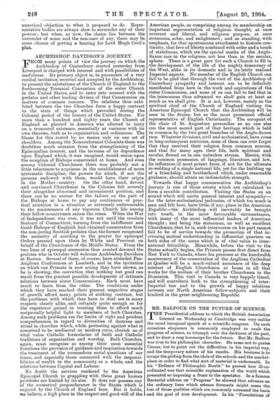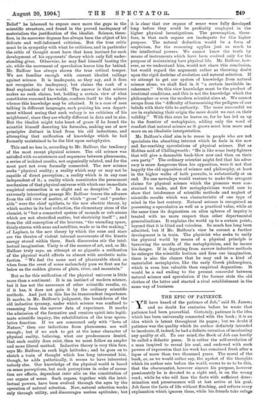Belief" he laboured to expose once more the gaps in
the scientific structure, and found in the proved inadequacy of materialism the justification of the, idealist Science, there- fore, in its narrower dogmas has always been the object of his delicate and well-informed criticism. But the true critic must be in sympathy with what he criticises, and in particular the critic of thought must have that keen instinct for each development of his opponents' theory which only full under- standing gives. Otherwise, he may find himself beating the air, while the movement of speculation leaves him far behind. Mr. Balfour has always shown the true critical temper. We are familiar enough with current idealist railings against science. It is inadequate, so they say, and it does not recognise its inadequacy, but claims the rank of a final explanation of the world. The answer is that science makes no such claims, but, holding a certain view of what constitutes reasoned knowledge, confines itself to the sphere whence this knowledge may be attained. It is a case of men talking in different languages, each praising his own depart- ment without seeing that such eulogy is no criticism of his neighbours', since they are wholly different in data and in aim. But the idealist might take heart of grace if he found the scientrst himself deserting his formulas, making use of new principles distinct in kind from his old inductions, and attempting that unification of knowledge which he had formerly maintained to be the blot upon metaphysics.
This and no less is, according to Mr. Balfour, the tendency of the most recent physical science. The old science was satisfied with co-existences and sequences between phenomena, a series of isolated results, not organically related, and for the most part not even formally connected. The new science seeks "physical reality; a reality which may or may not be capable of direct perception ; a reality which is in any case independent of it; a reality which constitutes the permanent mechanism of that physical universe with which our immediate empirical connection is so slight and so deceptive." In an extremely interesting passage Mr. Balfour traces the advance from the old view of matter, of which " gross " and "ponder- able" were the chief epithets, to the new electric theory, by which matter in its last reduction, the elementary atom of the chemist, is "but a connected system of monads or sub-atoms which are not electrified matter, but electricity itself " ; and from the old conception of the heavens, "the unending space, thinly strewn with suns and satellites, made or in the making," of Laplace, to the new theory by which the suns and stars are the theatre of violent internal movements of the kinetic energy stored within them. Such discoveries stir the intel- lectual imagination. Unity is of the essence of art, and, as Mr. Balfour truly says, an attempt at so gigantic a unification of the physical world affects us almost with aesthetic satis- faction. "We feel the same sort of pleasurable shock as when from the crest of some melancholy pass we first see far below us the sudden glories of plain, river, and mountain."
But so far this unification of the physical universe is little more than a sentiment. It is an instinct of modern science, but it has not the assurance of other scientific results, or, if it has, it does not gain it by the ordinary scientific methods. And just in this lies its transcendent importance. It marks, in Mr. Balfour's judgment, the breakdown of the old inductive tyranny, under which science was confined to reasoning from the narrow data of experience. It marks the admission of the formative and creative spirit into legiti- mate scientific inquiry, the rehabilitation of the true specu- lative function. If we are concerned only with "laws of Nature," then our inductions from phenomena are well enough ; but if we seek to get at the inner character of physical reality, believing, what our predecessors denied, that such reality does exist, then we must follow an ampler and more liberal method. Inductive theory is very thin fare, says Mr. Balfour, in such high latitudes ; and he goes on to sketch a train of thought which has long interested him, though, he adds pathetically, it seems to have interested nobody else. Our knowledge of the physical world is based on sense perceptions, but such perceptions in order of causa- tion are effects, dependent inter alia on the constitution of our organs of sense. Such organs, together with the intel- lectual powers, have been evolved through the ages by the operation of natural selection. Now, natural selection works only through utility, and discourages useless aptitudes; but it is clear that our organs of sense were fully developed long before they could be profitably employed in the higher physical investigations. The presumption, there- fore, is that such organs are inadequate for this higher purpose. The natural deduction would be a form of scepticism, for the reasoning applies just as much to the intellectual powers. We cannot know the truth by means of instruments which have been evolved only for the purpose of maintaining bare physical life. Mr. Balfour, how- ever, as we understand him, would not share this conclusion. but would regard the argument rather as throwing doubt upon the rigid doctrine of evolution and natural selection. If we attempt to get our system of knowledge from natural science alone, we shall find in it "a certain inevitable in- coherence." On this view knowledge must be the product of irrational conditions, and this is not the knowledge which the philosopher or even the modern scientist aims at. We cannot escape from the "difficulty of harmonising the pedigree of our beliefs with their title to authority. The more successful we are in explaining their origin the more doubt we cast on their validity." With this crux he leaves us, for he has led us up to the frontier of metaphysics, adding only the word of comfort that natural science as it grows must lean more and more on an idealistic interpretation.
Mr. Balfour's chief aim is to rouse in people who are not specialists the absorbing interest which he feels in the new and far-reaching speculations of physical science. But as Hobbes said of Chillingworth : "He is like some lusty fighters that will give a damnable back-blow now and then on their own party." The ordinary scientist might feel that his advo- cacy is more dangerous than his opposition, were it not that happily the old opposition of science and philosophy, at least in the higher walks of both pursuits, is substantially at an end. No one nowadays would venture to make the arrogant claims for physical science which the pioneers were con- strained to make, and few metaphysicians would care to show that intolerance of scientific methods and neglect of scientific results which was characteristic of one type of mind in the last century. Natural science is recognised as possessing a speculative as well as a practical value, while at the same time its dogmatism on alien spheres of inquiry is treated with no more respect than other departmental generalisations. It explains the world up to a certain point; beyond that it is blind and voiceless. So much has long been admitted, but if Mr. Balfour's view be correct a further development is in train. The physicist who seeks to unify the physical world by means of a physical principle is borrowing the mantle of the metaphysician, and he incurs his danger. If in departing from narrow inductive methods he enlarges the scientific horizon and fires our imagination, there is also the chance that he may end in a kind of materialist metaphysics, like the early Greek philosophers, which is even less valuable than empirical dogmatism. It would be a sad ending to the present concordat between natural science and speculation if the former stole the old clothes of the latter and started a rival establishment in the same way of business.



































 Previous page
Previous page